Using Feng Shui to help your customers & increase sales (See Drawings Below).
Editor's note: Ten years ago, how many of your customers had heard of Feng Shui? Today Feng Shui practitioners in North America are brought in to advise corporations, home owners and even studio apartment dwellers.
Many sales consultants in home furnishings stores have a passing familiarity with the term through contact with customers, decorating magazines and articles on millennial trends. Most do not know much more than it has a Chinese name and has something to do with decorating.
Feng Shui is a rigorous discipline whose reach extends beyond most western ideas of interior design.
Like western design, Feng Shui practice can incorporate concepts of order, arrangement, scale, symmetry, propriety and economy to create a harmonious looking design. From a Feng Shui perspective, however, room design takes on additional meaning that permeates the more subtle areas of the way a person relates to him or herself, family, society and the environment. Feng Shui adjustments can be made in a yard, a house, a room, or even on top of a single piece of furniture.
For some home furnishings merchants, Feng Shui can provide an additional tool to convey the "idea" to customers that they want to help them to create a beautiful, healthy home environment.
If your customers want to make minor changes in their lives if they want to become healthier, wealthier or wiser if they want to improve relationships or move past unpleasant ones perhaps an adjustment to their living spaces can help.
If some of your consumers are interested in holistic medicine, acupuncture, meditation or metaphysics, they are probably open to the practice of Feng Shui.
Service oriented sales consultants know that house calls can help their customers make better decorating decisions... and these decisions generally involve increases in the sale of furniture and accessories.
You might offer a Feng Shui consulting services to help you get into your customer's homes. You might also invite your customers to a Feng Shui seminar or set up a display area complete with Feng Shui books, informational signage, decorative mirrors, small fountains, area rugs even silk flowers and wind chimes.
FENG SHUI & FURNITURE
Feng Shui considers and examines the flow of energy, or "ch'i" (as the Chinese refer to it) in a space. The flow of this ch'i is the result of several factors: how the space was structurally built, what occurred with the previous owners/tenants, and what the current occupants bring with them. One other determination of ch'i flow is how furniture is set-up. Furniture arrangement can send certain messages to the people who live there, whether they are aware of these messages or not.
By helping to arrange furniture in a particular way, the skilled practitioner of Feng Shui can assist in alleviating a negative issue for their clients as well as "inviting" positive influences into their lives.
This process doesn't always require new furniture, but it would help if the furniture doesn't hold past negative associations. For example, if your customer has end tables that came from a prior, painful relationship, (from a Feng Shui perspective) it will keep them tied to the past when they are trying to move forward. If a painting was given to them by a dear friend whom they love and admire, then this is an item they would definitely want in their home environment.
Shown on the following pages are room situations, both "before and after", that illustrate certain challenging Feng Shui issues and how to remedy them. You may find it hard to believe that a space would be set up as shown, however, I consistently observe similar situations. You will see that by shifting furniture in simple ways or purchasing a few additional items, you can help your customer to create a whole new setting and send a new message to themselves. If they come to your store to purchase some new things for a particular room in their house, and are interested in Feng Shui, you can help them to acquire the correct pieces based on what they are trying to accomplish in their life.
One of the more common issues I hear when on a Feng Shui appointment is that over time a husband and wife have stopped talking to one another. This in turn leads to other relationship problems. Often communication problems have also shown up between them and their children. It's no surprise, then, when I see their family-room arrangement (top of Figure 1) with all the chairs facing the television. Of course, there's no communication between the family members. They are not looking at each other. A simple correction is shown underneath. By changing the relationship of the chairs to the sofa, the message is more one of conversation rather than watching television. Although the TV set is still in the room, it is no longer the focus.
Another communication issue that seems to play out in the living room is shown in Figure 2. Here one chair is set across the room, detached from the rest of the activities. Firstly, no one would probably sit in the chair because of its distance from the main conversation area, but, if someone did, they would have a hard time being part of the group. Someone in the family may feel like they don't belong. This situation is worsened by the fact that the isolated chair is also positioned between the two doorways in the traffic flow. The person sitting in the lone chair may often be interrupted due to this traffic pattern. A very easy and obvious solution is to bring the chair into the grouping to bring more harmony and unity to the family.
A common tendency I see so often is to place the furniture all around the outside walls, as in Figure 3. As in the first example, arranging furniture in such a way doesn't allow for easy conversation since people may have to talk loudly to be heard. Individuals may feel alienated from one another in this family. Bring the furniture more into the center of the room and into a more intimate conversation grouping.
A lot of times I'm asked to resolve the issue of a client wanting to have a partner in their lives. It seems there's a problem attracting the right mate. Even though the relationship may begin very casually, without the intimacy of a bedroom, it's the bedroom that still projects a person's intention around a relationship. It's the bedroom that holds the metaphor about how a client views the introduction of another person into the space. When I see the bedroom as depicted in Figure 4, it gives me an indication of the lack of seriousness of their request. Consciously or unconsciously, the bedroom has been set up for a single person, with one night-stand, one chair and one way to get into the bed. A prospective partner wouldn't feel very welcome, not only in the bedroom, but in other parts of their relationship. Chances are that, if someone sets up their bedroom like this, they aren't too open to incorporating another person in their lives. The message they give themselves every day is one of self-sufficiency and independence to the exclusion of others. If that's what they want, then the bedroom is fine. But by bringing in two night-stands and two chairs the message is changed. Moving the bed away from the wall also re-affirms the intention of making room for someone else.
Likewise, the kitchen table arrangement in Figure 5 is definitely not set up with a partner in mind. It's always better to have an even number of chairs around a kitchen or dining room table as it implies couples. In this set-up there is no possibility of a face-to-face conversation with these three chairs. The table is too big for the kitchen and needs to be replaced with a smaller one. Having a smaller table allows access on all sides, permits an even number of chairs and enables conversation across the table. Switching to a round table creates harmonious, cooperative experiences between the people sitting there.
As you can see, using Feng Shui principles, a person can change what they want in life by moving and incorporating furniture in a more auspicious flow. Usually, once the pieces of furniture have been shifted, a client will have an immediate positive experience. It just "feels" right.
Having the most expensive furnishings isn't what's important. But if a person compromises on what they want by buying the cheapest option, they will reinforce the message to themselves that they can't afford or don't deserve what they really want in life. When the furnishings are giving the opposite message, internal conflicts arise. Having something affordable is different than having something cheap; having something special is different than having something extravagantly expensive. Each individual must decide for themselves what they want in life and then begin to create the confirmation of that message in how they arrange their furniture.
FENG SHUI TIPS & TECHNIQUES
- Hang a wind-chime by your front door if you live at the end of a cul-de-sac to keep the energy from stagnating in front of your house.
- Hang a mirror over a fireplace to balance the amount of fire coming from the fireplace (a mirror representing water).
- Have a high-backed chair at your desk to help support you in making decisions and to give you a sense of backing.
- When moving into a new home, ring your doorbell for the first nine days to announce your presence and lay claim to the space.
- Paint your front door a color different from anything else on your house to attract good opportunities into your life.
- Situate your desk so that when you're seated at it, you can see the entrance to the room.
- Always have a headboard on your bed to symbolize support between partners and between anyone else in your life.
- Use your front door as often as possible to stimulate good luck coming into your house.
- When you stand at your stove-top if you're facing a wall, have a stainless steel teapot on one of the burners, allowing you to see who's coming behind you.
- Do not sleep with a toilet on the other side of the wall from your head as it can "drain" your health while you sleep.
- Do not position your desk with a toilet on the other side of the wall as you will tend to get "pissed off."
- If the toilet is the first thing you see when you enter your house, shut the bathroom door so you don't set up
intestinal problems.
- Fix all leaky faucets as they represent money leaking out of your life.
- If you can see the toilet when you're lying in bed, close the door into the bathroom and keep the lid down on the toilet to prevent a "drain" on your energy.
- If possible, place a toilet behind the door going into the bathroom. Since it's not the first thing you'll see, its draining influence is lessened.
- Keep the door to a bathroom closed if it is at the end of a long hallway, as all of your energy will scoot down the hall and be flushed away.
- If you have double sinks in your bathroom, install one full mirror above the sinks to unify a potential split between partners.
- Install a fountain in your bedroom if you can hear a toilet flushing above you.
- Hang a mirror in the dining room low enough to reflect the top of the table. The abundance of food implies lots of money in the household.
- Hang a mirror on a wall that reflects a lake or river outside, which is symbolically bringing you money.
- Make sure all the burners on your stove work to enable money to come in.
- Use all the burners on your stove, not just one favorite, to assure money coming in from many possibilities.
- Turn on all your burners once a day if you want to jump-start your financial status.
- Place a jade plant (often called a "money" plant) near your front door to increase your wealth.
- Place 3, 6 or 9 Chinese coins under your welcome mat to welcome money into your house.
- Have a fountain by the front door (inside or out) to attract the flow of money.
- Place a small mirror (reflective side out) in a window if you live near a hospital, funeral home, cemetery or church to keep any trauma from spilling over into your space.
-
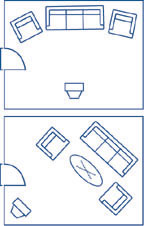 |
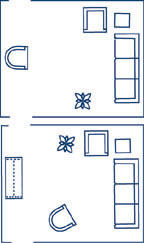 |
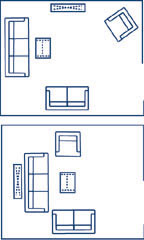 |
| FIGURE 1 ABOVE |
FIGURE 2 ABOVE |
FIGURE 3 ABOVE |
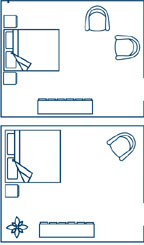 |
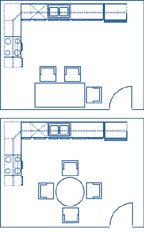 |
If your customers want to make minor changes in their lives...
if they want to become healthier, wealthier or wiser...
if they want to improve relationships or move past unpleasant ones...
perhaps an adjustment to their living spaces can help. |
|
FIGURE 4 ABOVE |
FIGURE 5 ABOVE |
|
Carole J. Hyder, of Minneapolis, MN, has been a Feng Shui consultant since 1992. She teaches and lectures all over the nation and offers a two-year training program. She is the author of "Wind and Water: Your Personal Feng Shui Journey." Questions on Feng Shui can be directed to her care of FURNITURE WORLD at editor@furninfo.com.